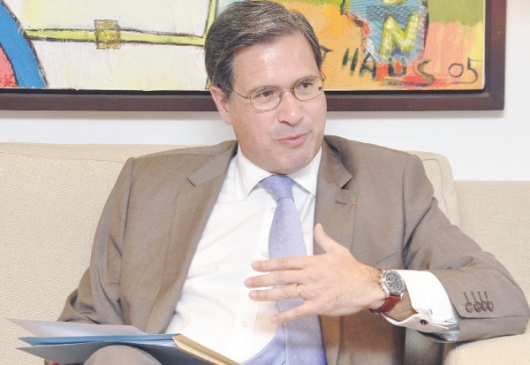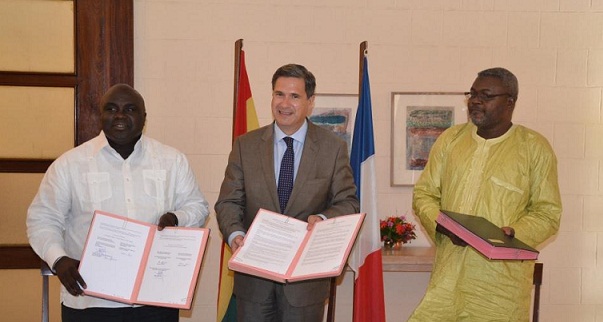Q. TELL US ABOUT YOURSELF

I am a career diplomat. I assumed office in Accra in December, 2011. I had the opportunity to discover Ghana 21 years ago and have been to Africa many times. The ties I have with this continent are very strong. I appreciate the cultures, traditions and way of life of Africans. I learnt some Swahili.
I am trying to learn some Twi. I have always in my career taken attention to the issues of the African continent. I have seen how much the continent has changed in 20 years, in terms of economy, governance, youth and I am very confident for the future of Africa
Q. YOUR OPINION ABOUT GHANA
I think Ghana is one of the most attractive countries on the continent. Ghana has a very strong history and past. It is fascinating to see the balances between the traditions which
continue to be prevalent in current life and at the same time the modernity of this country
Different governments for the past 20 years have chosen to develop the country on the basis of what has made the country viable in agriculture, mine energy and now oil and gaz. I think that Ghana is an example of what a very good country can do for its development: to preserve its traditions but at the same time accelerate its modernity.
Ghana is now a pillar of stability on the continent. First, because it is an area of democracy. I am struck by the quality of the civil society in the country and the place of NGOs and associations; the responsibility and maturity of the political stakeholders. In that sense, Ghana is opening the track for other African countries, not only in West Africa but widely on the continent. I think Ghana has made the real choices to become one of the best developed countries on the continent.
Q. WHAT CONSTITUTES FRANCE’S DIPLOMACY WITH GHANA AND OTHER COUNTRIES?

France has a very confident dialogue with Ghana due to the fact that we are sharing some common values such as good governance, democracy, peace, stability and promotion of human rights, development. France has decided to upgrade its bilateral relations with Ghana, confident that the message of Ghana towards the world is very important.
We appreciate the fact that Ghana is participating in some five (5) peace keeping missions in the world. This proves that the country is dedicated to peace and stability in the world. 60 French companies are working in Ghana and the bilateral trade is about 1 billion Euros each year. In the area of culture, the partnership with the Ghanaian universities and promotion of the French language is vital.
Q. WHAT ARE YOUR NEXT STEPS?
At the end of May, a delegation of 30 businessmen, belonging to an association called
MEDEF (Movement of French Enterprises), would come to Ghana to develop prospects of investment in the country. Last year, we had to invest in Ghana about 400 million dollars. That means France is very confident for the future.
For trade, we have the idea of creating a French Chamber of Commerce in Ghana to promote French businesses in Ghana and Ghanaian businesses in France. This Chamber of Commerce should open its doors this year.
We want to accelerate the political dialogue between France and Ghana and the capacity to have French ministers in Ghana and vice versa to discuss issues of peace, stability, climate change, environment and promote issues of the United Nations (UN).
Q. WHAT ARE THE PLANS PUT IN PLACE TO ENSURE THAT MORE GHANAIANS STUDY FRENCH

H.E. M. Mohamed Mostafa Heider Ambassador of Egypt; Dzifa Gomashie Deputy Minister for TourismCulture_creative Arts; H.E Frederic Clavier
Ghana is an associate member of the Francophony since 2006 and is at the same time surrounded by francophone countries. A part of the future of the country is going through a capacity to make bridges with francophone countries.
It is in the interest of Ghana to have the best and closest ties with francophone countries and France also. As for the case of Ghana, the French language is in good health. It is taught in primary and junior high schools. We do have aproblem with the senior high schools due to the fact that it is an option. The five Alliance Francaise centers in Ghana are in a very good health. For example, the Alliance Francaise in Accra is teaching 2,000 students.
French is more and more a language of communication in business, science and I am very impressed by the fact that when I go to the various Ghanaian universities, all the Vice Chancellors tell me they want more French in their universities. I can disclose here that, next June, we will have in Accra the first high level meeting between French and Ghanaian Universities with the purpose to develop partnerships between the two types of
university.
I know there are other partnerships in the areas of mathematics, physics and trade so the focus is to accelerate the processes.
Q. ANY WORD ON THE FRANCOPHONY WEEK AND WOMEN’S DAY?
I see in the Francophony as the capacity to invent the 21st century. The Francophony is supposed to be a community of people who share common values and have the power to create what the 21st Century should be. The French language is a universal language that defends other languages as a way to create conditions of optimism.
Q. WHAT IS THE MOST INTERESTING EXPERIENCE YOU HAVE HAD IN GHANA?
First, there are many (laughs). The most interesting thing I have seen in Ghana is may be dedicated to the youth; the Ghanaian youth is dynamic, clever and enlightened. I have in the different regions of the country met many young Ghanaians. I have always been impressed by the way they see life: they are very optimistic. They do think when they are aged between 12 and 18, that life would be better for them. I don’t think if you were speaking with some young Westerners they would be that hopeful about their future.
Source: Panafrican magazine/ edition# 8 page 18


